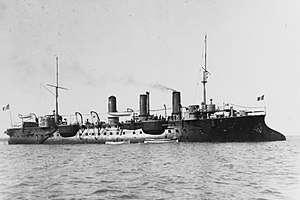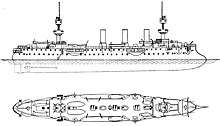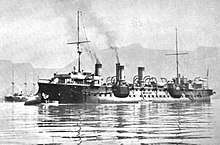French cruiser Bugeaud
Bugeaud [by.ɡo] was a Friant-class protected cruiser of the French Navy built in the 1890s, the second of three ships of the class. The Friant-class cruisers were ordered as part of a construction program directed at strengthening the fleet's cruiser force. At the time, France was concerned with the growing naval threat of the Italian and German fleets, and the new cruisers were intended to serve with the main fleet, and overseas in the French colonial empire. Bugeaud and her two sister ships were armed with a main battery of six 164 mm (6.5 in) guns, were protected by an armor deck that was 30 to 80 mm (1.2 to 3.1 in) thick, and were capable of steaming at a top speed of 18.7 knots (34.6 km/h; 21.5 mph).
 Bugeaud | |
| History | |
|---|---|
| Name: | Bugeaud |
| Namesake: | Thomas Robert Bugeaud |
| Builder: | Arsenal de Cherbourg |
| Laid down: | June 1891 |
| Launched: | 29 August 1893 |
| Completed: | May 1896 |
| Stricken: | 1907 |
| Fate: | Broken up |
| General characteristics | |
| Displacement: | 3,809 long tons (3,870 t) |
| Length: | 94 m (308 ft 5 in) pp |
| Beam: | 12.98 m (42 ft 7 in) |
| Draft: | 6.30 m (20 ft 8 in) |
| Installed power: |
|
| Propulsion: |
|
| Speed: | 18.7 knots (34.6 km/h; 21.5 mph) |
| Range: | 6,000 nmi (11,000 km; 6,900 mi) at 10 kn (19 km/h; 12 mph) |
| Complement: | 339 |
| Armament: |
|
| Armor: |
|
Bugeaud was initially assigned to the Mediterranean Squadron after her completion in 1896 before being transferred to serve as the flagship of the Levant Division in the eastern Mediterranean. During that time, she participated in the International Squadron that intervened in the Cretan Revolt of 1897–1898. Bugead was sent to East Asia in 1900 in response to the Boxer Uprising in Qing China, where she remained for the next several years. Shipyard facilities were poor, and an overhaul conducted in 1903 took more than six months to complete; even afterward, Bugeaud was in poor condition, and she was struck from the naval register in 1907 and then broken up.
Design

In response to a war scare with Italy in the late 1880s, the French Navy embarked on a major construction program in 1890 to counter the threat of the Italian fleet and that of Italy's ally Germany. The plan called for a total of seventy cruisers for use in home waters and overseas in the French colonial empire. The Friant class was the first group of protected cruisers to be authorized under the program.[1][2]
Bugeaud was 94 m (308 ft 5 in) long between perpendiculars, with a beam of 12.98 m (42 ft 7 in) and a draft of 6.30 m (20 ft 8 in). She displaced 3,809 long tons (3,870 t). Her crew consisted of 339 officers and enlisted men. The ship's propulsion system consisted of a pair of triple-expansion steam engines driving two screw propellers. Steam was provided by twenty-four coal-burning Belleville-type water-tube boilers that were ducted into three funnels. Her machinery was rated to produce 9,500 indicated horsepower (7,100 kW) for a top speed of 18.7 knots (34.6 km/h; 21.5 mph).[3] She had a cruising range of 6,000 nautical miles (11,000 km; 6,900 mi) at a speed of 10 knots (19 km/h; 12 mph).[4]
The ship was armed with a main battery of six 164 mm (6.5 in) 45-caliber guns. They were placed in individual pivot mounts; one was on the forecastle, two were in sponsons abreast the conning tower, and the last was on the stern. These were supported by a secondary battery of four 100 mm (3.9 in) guns, which were carried in pivot mounts in the conning towers, one on each side per tower. For close-range defense against torpedo boats, she carried four 47 mm (1.9 in) 3-pounder Hotchkiss guns and eleven 37 mm (1.5 in) 1-pounder guns. She was also armed with two 350 mm (14 in) torpedo tubes in her hull above the waterline. Armor protection consisted of a curved armor deck that was 30 to 80 mm (1.2 to 3.1 in) thick, along with 75 mm (3 in) plating on the conning tower.[3]
Service history

The keel for Bugeaud was laid down at the Arsenal de Cherbourg in Cherbourg in June 1891,[3] and her completed hull was launched on 29 August 1893.[5] The ship conducted sea trials in early 1896, which revealed the need for alterations to improve her ventilation. Successful trials were held in April, during which she reached a top speed of 19 knots (35 km/h; 22 mph).[6] She was completed in May 1896, the last member of her class to enter service.[3] She was commissioned that year,[7] in time to participate in that year's fleet maneuvers with the rest of the Mediterranean Squadron, serving in the cruiser screen for the 1st Division, along with the armored cruiser Amiral Charner and the torpedo cruisers Wattignies and D'Iberville. The maneuvers for that year took place from 6 to 30 July.[8]
Bugeaud was transferred to the Levant Division in 1897, but engine problems forced her to return to Toulon for repairs, her place in the division being taken by the cruiser Suchet. Bugeaud was reassigned to the Mediterranean Squadron after repairs were completed later that year.[9][10] She was still in service with the squadron in 1898.[11] Later that year, she was deployed to the coast of Ottoman Syria, where she relieved Amiral Charner as the flagship of the Levant Division. The unit at that time also included the torpedo cruisers Vautour, Faucon, and Condor. The divisional commander at the time was Vice Admiral Édouard Pottier. During this period, she served with the International Squadron that intervened in the Cretan Revolt. She carried Prince George of Greece and Denmark to Crete, where he became the High Commissioner of the Cretan State, part of the negotiated settlement to the conflict. The International Squadron was thereafter disbanded.[13]
Bugeaud was deployed to East Asia in February 1900,[7] and both of her sister ships had joined her there by January 1901 as part of the response to the Boxer Uprising in Qing China; at that time, six other cruisers were assigned to the station in addition to the three Friant-class ships.[14] She remained in East Asian waters in 1902,[15] but with fighting over in China, the unit began to be reduced in size. By 1903, the unit consisted of the armored cruiser Montcalm and the protected cruisers Châteaurenault and Pascal.[16] Later that year, Bugeaud underwent an overhaul in Saigon that lasted some six months; the lengthy period out of service resulted from the insufficient shipyard facilities in French Indochina. Despite the work, Bugeaud was still in poor condition by 1904, being unable to exceed 16 to 18 knots (30 to 33 km/h; 18 to 21 mph).[17] Bugeaud was struck from the naval register in 1907 and was thereafter sold to ship breakers for dismantling.[3][5]
Notes
- Ropp, pp. 195–197.
- Gardiner, pp. 310–311.
- Gardiner, p. 311.
- Garbett 1904, p. 563.
- Gardiner & Gray, p. 193.
- France, p. 37.
- Service Performed, p. 299.
- Thursfield, pp. 164–167.
- Garbett 1897, p. 342.
- Brassey 1897, p. 57.
- Brassey 1898, p. 57.
- Clowes, pp. 444–448.
- Jordan & Caresse, p. 218.
- Brassey 1902, p. 51.
- Brassey 1903, p. 62.
- Brassey 1904, pp. 90–91.
References
- Brassey, Thomas A. (1897). "Chapter III: Relative Strength". The Naval Annual. Portsmouth: J. Griffin & Co.: 56–77. OCLC 496786828.
- Brassey, Thomas A. (1898). "Chapter III: Relative Strength". The Naval Annual. Portsmouth: J. Griffin & Co.: 56–66. OCLC 496786828.
- Brassey, Thomas A. (1902). "Chapter III: Relative Strength". The Naval Annual. Portsmouth: J. Griffin & Co.: 47–55. OCLC 496786828.
- Brassey, Thomas A. (1903). "Chapter III: Relative Strength". The Naval Annual. Portsmouth: J. Griffin & Co.: 57–68. OCLC 496786828.
- Brassey, Thomas A. (1904). "Chapter IV: Comparative Strength". The Naval Annual. Portsmouth: J. Griffin & Co.: 86–107. OCLC 496786828.
- Clowes, William Laird (1903). The Royal Navy: A History From the Earliest Times to the Death of Queen Victoria. VII. London: Sampson Low, Marston and Co. OCLC 632971260.
- "France". Notes on the Year's Naval Progress. Washington, D.C.: United States Office of Naval Intelligence. XV: 27–41. July 1896. OCLC 727366607.
- Garbett, H., ed. (May 1904). "Naval Notes: France". Journal of the Royal United Service Institution. London: J. J. Keliher & Co. XLVIII (315): 560–566. OCLC 1077860366.
- Garbett, H., ed. (March 1897). "Naval Notes: France". Journal of the Royal United Service Institution. London: J. J. Keliher & Co. XLI (229): 341–348. OCLC 1077860366.
- Gardiner, Robert, ed. (1979). Conway's All the World's Fighting Ships 1860–1905. London: Conway Maritime Press. ISBN 978-0-85177-133-5.
- Gardiner, Robert & Gray, Randal, eds. (1985). Conway's All the World's Fighting Ships: 1906–1921. Annapolis: Naval Institute Press. ISBN 978-0-87021-907-8.
- Jordan, John & Caresse, Philippe (2017). French Battleships of World War One. Annapolis: Naval Institute Press. ISBN 978-1-59114-639-1.
- "Naval Notes: France". Journal of the Royal United Service Institution. London: J. J. Keliher & Co. XLII (247): 1091–1094. September 1898. OCLC 1077860366.
- Ropp, Theodore (1987). Roberts, Stephen S. (ed.). The Development of a Modern Navy: French Naval Policy, 1871–1904. Annapolis: Naval Institute Press. ISBN 978-0-87021-141-6.
- "Service Performed by French Vessels Fitted with Belleville Boilers". Notes on Naval Progress. Washington, D.C.: United States Office of Naval Intelligence. 20: 299. July 1901. OCLC 699264868.
- Thursfield, J. R. (1897). Brassey, Thomas A. (ed.). "Naval Maneouvres in 1896". The Naval Annual. Portsmouth: J. Griffin & Co.: 140–188. OCLC 496786828.